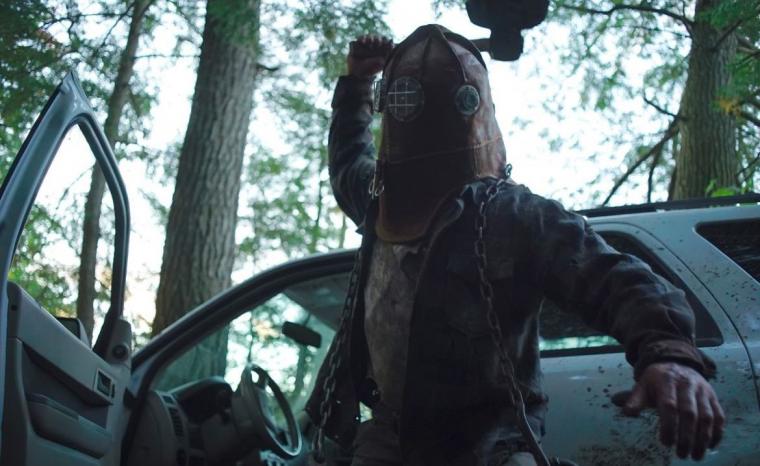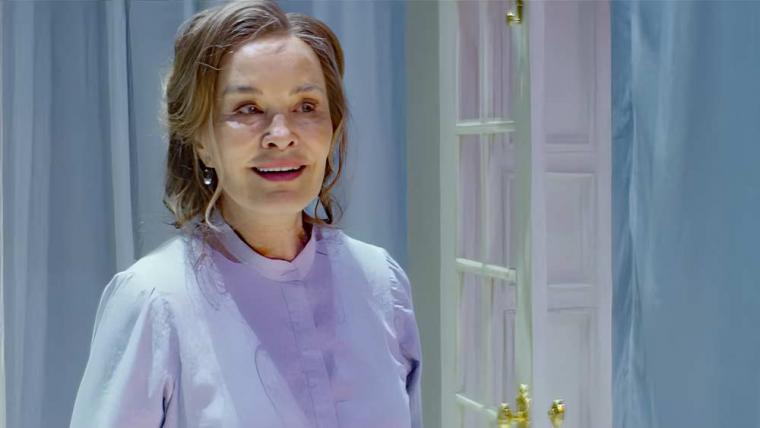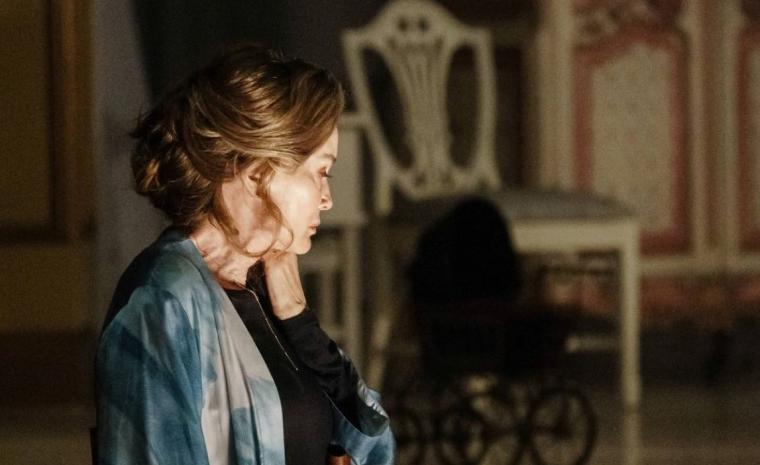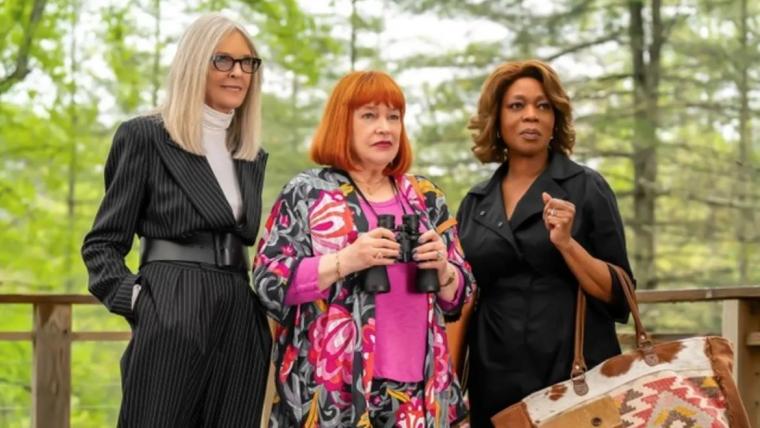
Robert De Niro, Bobby Cannavale, and William Fitzgerald in Ezra
EZRA
In the familial road-trip dramedy Ezra, Bobby Cannavale plays the leading role of struggling standup comic Max Brandel, and he's mad at everybody. Everybody.
He's angry with ex-wife Jenna (Rose Byrne) for divorcing him, and angry at her boyfriend Bruce (the film's director Tony Goldwyn) for moving into their home so soon after Max moved out. He's angry with his father Stan (Robert De Niro) for his pushy career advice – maybe also for now being forced to live with the man – and with his long-absent mother for ditching the family in Max's youth. He's angry with his agent (Whoopi Goldberg) for not booking the gigs Max feels he deserves. He's angry with his pre-teen son Ezra's principal for wanting the autistic boy to attend a school for special-needs students; with Ezra's teachers and doctors for believing that the child should be medicated; with Big Pharma for merely existing. And although he would likely deny it, Max is even angry with Ezra (William Fitzgerald, himself on the autism spectrum) for being autistic in the first place, and unable to be hugged without shrieking. That's a lot of interior and frequently exterior rage for one character, and for one movie, and in a lesser work, Cannavale's Max could easily have come off as unbearable.
Yet movies can get away with asshole central figures so long as audiences understand why they're behaving like assholes, and the chief strength of Ezra is that we fully empathize with, and even kind of adore, Cannavale's Max despite him doing one deeply stupid, even criminal thing after another. Cannavale convinces us that the only thing filling his shell of a human is love for his son. But that love is tied to so much anxiety, helplessness, desperation, and fury that it causes Max to impulsively act without thinking, and create massive trouble for himself and the boy under the guise of Ezra's “best interests.” Before Goldwyn's film is a half-hour old, Max has stormed out of his standup set, assaulted a doctor, spent a night in prison, and been slapped with a three-month restraining order preventing him from seeing his child. That's when Max sneaks through Ezra's bedroom window, borrows Stan's car without permission, and takes his son on an impromptu trek from New Jersey to Michigan. Ezra's mother, to say nothing of the law, is not amused.
Up to this point, I was already inordinately impressed by Goldwyn's and screenwriter Tony Spiridakis' movie, the rather sentimental trailers for which didn't hint at its consistently dark (R-rated) edges and occasionally abrasive realism. Max's bitter yet still affectionate exchanges with Jenna and Stan suggest people who've known each other too long, and are simply too tired, to sugar-coat their opinions, and I applauded Spiridakis' script for not making Ezra a benignly lovable tyke. In his screen debut, Fitzgerald is intensely charming and oftentimes very funny – he peppers his conversations with movie and TV quotes – but like any pre-teen, he can also be an enormous pain in the ass, as well as an unpredictably volatile one. (Byrne, who's exceptional, has a memorable bit in which Jenna and Ezra stroke each other's earlobes as a calming technique, and you can see the hesitation in Jenna's demeanor as she considers whether her son might suddenly rip out her hoop earrings.) With Cannavale's delivery pitch-perfect and his gags reasonably solid, even Max's standup sets are believable, and movies almost never get standup comedy right. (Thanks to Ezra and Baby Reindeer, this trend might be reversing itself.) After Max effectively kidnaps his child, though, you realize that Ezra is truly playing for keeps, and that we're in no way meant to view Max's spontaneous plan as heroic, or even sane. We know that Max would never do anything to intentionally harm his son, but what unintentional harm might result?

While Spiridakis' dialogue is delightfully spiky and he writes beautiful scenes for his four major figures, Ezra's largely contrived plotting prevents the movie from ever being as great as you want it to be. Not long after arriving in Michigan and the rural home of his former-standup best friend (a first-rate Rainn Wilson), Max learns that he has unexpectedly scored a guest spot on Jimmy Kimmel Live!, and he and Ezra quickly hit the road en route to California. Yet beyond being wildly unlikely – for reasons passing understanding, Kimmel's team can't fly Max to the studio, and he'll barely make it by car in time for taping – would the offer still stand after an Amber Alert leads to Max's face being plastered on TV screens nationwide? There's also a too-convenient detour in which Max visits a past flame (Vera Farmiga) and leaves with a new set of wheels, plus a dopey bit of near-slapstick involving a purloined frying pan that shouldn't have made the final cut. (The end-credits gag involving Kimmel, meanwhile, is a severe tonal mistake.)
What's bothersome or borderline-obnoxious about Goldwyn's release, however, is more than made up for in its reams of gorgeously rendered grace notes, and in a lovely surprise given their characters' incessant quarreling, many of them land in the sequences shared by Cannavale and De Niro. In one, Stan talks Max off the ledge when the latter fights an urge to hit his kid; in another, Stan apologies for his part in Max's crappy childhood; in both, De Niro and Cannavale reach levels of buried pain and regret that constitute some of their finest dramatic work of the last decade. Yet Ezra is primarily worth seeing, and very much worth seeing, for the stunning rapport between Cannavale and the young Fitzgerald, the latter of whom holds his own against his more seasoned co-star when, in all honesty, he isn't stealing the film right out from under him. No points for correctly guessing whether Max, by the finale, finally gets the hug he's long been craving, but you won't want to be without tissues if and when he does.

IN A VIOLENT NATURE
Yesterday, a horror-fan friend texted that he finally got around to watching Skinamarink, that insanely low-budget oddity from January of '23 shot to resemble a young child's modestly creepy, mostly boring nightmare. He didn't like Skinamarink, just as I didn't. His message, though, caused me to at least reflect on the film, and realize that it was still rattling around my brain in ways that a number of subsequent, superior works weren't. Had I composed thoughts on In a Violent Nature immediately after seeing writer/director Chris Nash's feature debut this past Friday, my review likely would've been a massive pan that highlighted the movie's significant tedium, age-inappropriate cast, limited presentational technique, and some of the most flabbergastingly bad dialogue I've ever heard in a slasher flick. However, after nearly three days away from the experience, it, too, is lingering in memory more than expected. And while I still don't care for Nash's offering, I can recall a good dozen bits – among them five outrageously gruesome murders – with absolute clarity. That's not a recommendation, but it's not nothing, either.
In a Violent Nature's figurative hook (there's also a much-employed literal one) comes from a simple premise in the form of a question: What would result if, for the entirety of a Friday the 13th sequel, the camera stayed almost completely focused on Jason Voorhees? Well, for the one thing, as evidenced here, the movie would be slow. Really slow. Jason and his ambling ilk never run – it's practically a shock, here, when the superhuman monster Johnny slightly quickens his gait – yet always seem to be one step behind their racing, screaming victims-to-be. And so, for much of Nash's film, we simply follow, in no particular rush, as the hideously deformed, single-minded Johnny (Ry Barrett) sneaks up on unsuspecting prey by lazily traipsing through the forest or the tall grass; it's like this behemoth has been cast in a gory remake of Terrence Malick's The Thin Red Line. (When the creep is feeling particularly adventurous, he walks toward a swimmer underwater, apparently holding his breath for upwards of three minutes.) In addition to slow, however, the film is fundamentally unsurprising and anti-scary, because for nearly an hour-and-a-half, the only thing that can happen is Johnny eventually reaching his destinations and then killing them. As it meant the actors would stop uttering Nash's ridiculous attempts at conversation and reminding us that they looked 10 years older than the college types (or, God forbid, teens) they were meant to portray, I was largely okay with this. It still took significant will to avoid nodding off.
Yet given a few days of reflection, making the cast as colorless as possible has a benefit, because without any pressing need to see these people live, you can thoroughly enjoy the ways they die – if you have the stomach for it. I can't fathom that Nash's indie outing had a hefty production budget, but I still couldn't believe some of the effects he was pulling off, with the performers appearing very much alive until the splatter-flying moments in which they aren't. One dude getting his head smashed in with a boulder honestly made me gasp, while two other poor souls seem to be actively breathing until blades slice off their heads. (In one case, half their head.) Beyond question, though, the execution that genre fans will be talking about for years involves the most impossible yoga position ever; I instantly regretted not being in a packed auditorium when a young woman was essentially made to look at her own back, and from an upward angle, no less. And just when you think events can't possibly get gorier ... they don't, and we're left with a deeply unsettling, cruelly protracted, 10-minute postscript that jangles your nerves with greater alacrity than any of the nauseating kills preceding it. Clearly, Chris Nash is already some kind of demented talent, and while I didn't “like” In a Violent Nature, per se, I'm pretty sure I might never forget it.

THE GREAT LILLIAN HALL
Before the 2023 Writers Guild and Screen Actors Guild strikes effectively halted movie production for half the year, we learned that a new film version of Eugene O'Neill's family-tragedy masterpiece Long Day's Journey Into Night was planning to debut by December. The screen adaptation would star Jessica Lange, who received a 2016 Tony Award for her Broadway turn as matriarch and morphine addict Mary Tyrone, one of the most famously challenging roles in theatre history. Needless to say, we're still waiting for that release, though I understand that filming has been officially completed. But if you share similar excitement about finally viewing Lange in the role of a lifetime – it's my all-time favorite American play, with my second-favorite, A Streetcar Named Desire, also a past Broadway/movie showcase for the performer – HBO's new The Great Lillian Hall should easily tide you over until the cinematic LDJIN premieres. It's hardly O'Neill, yet director Michael Cristofer's drama about a legendary stage actress suffering from dementia is unmissable for the lyrical beauty and painful dynamism Lange provides. You can see all of this TV movie's gears dutifully grinding along, and still find yourself wiped out by the tremendous portrayal at its core.
Written by Elisabeth Seldes Annacone, whose aunt – theatre icon Marian Seldes – suffered from dementia before her 2014 passing, The Great Lillian Hall finds Lange's title character preparing for an ultra-hyped Broadway run as Madame Ranevskaya in Chekhov's The Cherry Orchard. It soon becomes clear that Lillian can't remember her lines, or her blocking, and when she's strong-armed into a doctor's visit, her diagnosis is one that she attempts to keep from friends, family, and, most essentially, the show's cast and crew. (With her concerned Cherry Orchard family, Lillian says her memory loss and disorientation are reactions to allergies; with her actual family, she says nothing at all.) Consequently, the crux of the drama lies less with Lillian's well-being than the plot-goosing question of “Will the show go on?”, and speaking as a lifelong theatre devotee/participant directly affected by a parent's current dementia, I found too much of Cristofer's and Annacone's well-meaning effort blithe and unconvincing. Although clearly designed as a love letter to theatre, the Cherry Orchard rehearsal sequences are awash with clichés – empathetic director, hard-as-nails producer, oblivious co-stars – and the scenes that directly address Lillian's dementia aren't individualized enough to differentiate them from what occurs in other titles (Away from Her, Still Alice, The Father) in the sub-genre-specific medical-drama category.
Cristofer's movie is also a little confounding in ways it didn't need to be. Lillian and her devoted assistant Edith (a reliably tart Kathy Bates) frequently share quotes from famous plays – a litany that includes a few of Lange's Blanche DuBois recitations – that they duly acknowledge, and yet a lengthy All About Eve exchange is delivered as if spoken for the first time, with neither character aware of the usurping. (Kathy Bates basically is Thelma Ritter in this film.) Within minutes of Lillian's dementia prognosis, we're told that realistic delusions are common, and we rightly expect that her conveniently omnipresent next-door neighbor Ty (Pierce Brosnan) will prove to be one of her hallucinations; he's actually just a handsome plot contrivance. A documentary about Lillian, with family and friends taking part, is filmed throughout, and while it gives Lange some beautiful black-and-white closeups, nothing ever comes from the conceit. On an almost scene-by-scene basis here, I found something to complain about. (The clichéd montage of The Cherry Orchard's opening night was gorgeously satirized by the TV comedy Pen15 nearly four years ago.) Yet Lange herself gave me no cause for complaint. I'd even go so far as to call this her most wondrous cinematic portrayal since 2009's Grey Gardens (for which she won an Emmy), if not 1994's Blue Sky (for which she won her second Oscar).

The role of a decades-lauded, fiercely well-regarded stage actor is practically an invitation, for authors and actors alike, to display the nightmare behind the acclaim – to demonstrate that no one could possibly be that much of a fearsome talent without also being a something of a monster. That's not, however, what Lange, Cristofer, and Annacone give us. Lillian is a perfectionist, to be sure, and in the introductory sequence, she's off-puttingly inappropriate when greeting people with memorized Madame Ranevskaya lines. (Her doorman and passers-by handle the conversational weirdness with half-smiles and cockeyed acceptance.) But Lillian is also friendly and funny and generous, so it hurts all the more when she vitriolically lashes out at her co-stars for her own memory lapses, or refuses to give her daughter Margaret (the excellent Lily Rabe) the affection the young woman so evidently needs. Lillian could easily have been constructed as a capitalized Diva. Yet Cristofer and Annacone demonstrate too much natural feeling for Lillian's plight for that to happen, and Lange's supremely, almost superhumanly, empathetic performance secures the deal and then some.
It's been a while since a movie presented me with a physical gesture that moved me to tears. But when Lillian's hands began uncontrollably shaking following her doctor's simple instruction on the folding of a piece of paper, I was a mess, and Lange continued to mess me up, emotionally, through every stage of the woman's early-dementia journey. Because no performers, not even solo performers, work in a void, I'd like to think that sharing scenes with her frequent American Horror Story co-stars Bates and Rabe helped guide Lange toward this portrayal, and beyond Cristofer and Annacone, her rapport with the marvelously down-to-earth Jesse Williams (as The Cherry Orchard's director) no doubt aided her greatness, too. But The Great Lillian Hall is wall-to-wall The Jessica Lange Show, and for those of us aching for Long Day's Journey or envious of those currently witnessing her Tony-nominated work in Mother Play on Broadway, it's a show that will absolutely suffice.

SUMMER CAMP
In a strange confluence of timing, The Great Lillian Hall turned out to be the second debuting Kathy Bates release I caught this past weekend, as it was preceded by my viewing of writer/director Castille Landon's Summer Camp. I truly don't know what to say. So instead, let me borrow the words of the patron who exited the auditorium ahead of me – a woman probably in her mid-to-late-70s, making her this comedy's choicest demographic. To quote her mini-critique, one shared with her equally 70-something companion: “That was the stupidest movie I've ever seen.” I immediately considered hiring this obviously wise lady as a freelance reviewer, because honestly, I can't do better than that.
A Book Club without a modicum of charm, an 80 for Brady without entendre and snap, the dismally, generically titled Summer Camp sends childhood besties Bates, Diane Keaton, and Alfre Woodard back to the hallowed seasonal home of their upbringing 50-ish years later, where they'll spend a week “roughing it” in an elaborately upgraded cabin, crushing on the aged boys they used to like and side-eyeing the pretty clique (led by Beverly D'Angelo) addicted to gossip and Pilates. The film is every bit as noxious as you might imagine, its humiliations including, but not limited to, septuagenarian Keaton freaking out when someone almost catches her kissing Eugene Levy, Keaton freaking out when she falls into a creek while rafting, and Keaton freaking out when her WiFi connection is disrupted. (For humiliation Keaton might not have been aware of, I'll point to her decision to wear, as is her wont, a complete, head-to-toe, cream-colored suit with matching hat – which she dons, for completely sensible reason, while camping.) The opening minutes of Landon's film feature flashbacks to young Diane inflicting a bloody injury on a fellow camper by shooting an arrow into his kidney, and young Kathy being coerced into inserting young Alfre's first tampon. Due to the astounding waste of its gifted participants, Summer Camp just gets more repellent from there.
I'd be remiss to not mention the abject, blessed nerve of Alfre Woodard, because she actually bothers to give a performance in this tripe. When her material isn't embarrassing her, which isn't often (at one point, she's required to fall off a horse into a pile of mud – an effect, in Landon's staging, apparently too expensive to show), Woodard emerges as a believably unhappy wallflower, and has a lovely scene of respite opposite the similarly low-key Dennis Haysbert. The best that can be said about the other actors is that they appear either impervious to shame (Keaton), or wholly disassociated from the goings-on (Levy), or happy to resort to old tricks. (Bates goes brash and boisterous and reprises her chin-quivering misery from Richard Jewell.) Summer Camp's younger castmates fare no better, with Josh Peck shoehorned into increasingly laugh-free menial-job scenarios and Betsy Sodaro maybe the most grimly unfunny second banana the hilarity-in-the-woods genre has yet seen. Forget Meatballs. This thing isn't even on a par with 1984's Up the Creek or that nightmarish Steve Zahn/Jonah Hill debacle Strange Wilderness – which, not for nothing, was my least-favorite movie of 2008. Never before have I so prayed for a cameo by Jason Voorhees.








